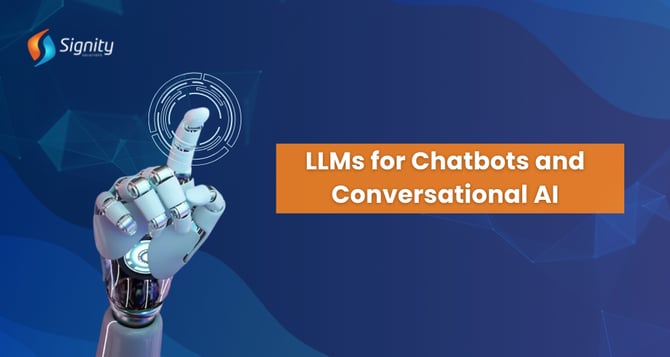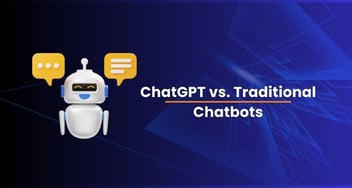LLMs for Chatbots and Conversational AI: Building Engaging User Experiences
Are you still using traditional chatbots for customer interactions? Did you know that LLM chatbot can boost and ensure a smooth customer experience every time they interact? Check how LLM chatbot development can help your business with conversational commerce.

Large Language Models have emerged as the central component of modern chatbots and conversational AI in the fast-paced world of technology. Just imagine conversing with a machine that is as intelligent as a human.
The use cases of LLM for chatbots and LLM for conversational AI can be seen across all industries like FinTech, eCommerce, healthcare, cybersecurity, and the list goes on.
LLMs like OpenAI's GPT-4 are an amazing example of Artificial Intelligence that is trained on vast amounts of textual data to understand and produce natural-sounding human language.
Conversational AI chatbots have been completely transformed by the advances made by LLMs in language production. With deep learning coming into the picture, Large Language Models are now able to produce correct and contextually relevant text even in the face of complex nuances.
Here are a few highlights of conversational AI solutions backed by Large Language Models that provide a great user experience:
- LLMs like GPT-3 and BERT excel in tasks like question answering and sentiment analysis.
- Large Language Models revolutionize text completion, dialogue generation, and translation, offering outputs that are not just coherent but remarkably human-like, thereby enhancing the customer experience.
- LLMs quickly adapt to new tasks with minimal data by leveraging pre-trained knowledge.
The above points are just the beginning. The next section explains in detail how LLM-powered chatbot solutions help businesses enhance their customer experience.
Key Takeaways
- LLM chatbots like GPT-4 offer natural, human-like interactions, enhancing customer satisfaction over traditional chatbots.
- LLM chatbots support multiple languages effortlessly, benefiting businesses operating at a global level.
- LLMs provide personalized, context-aware responses, making interactions more relevant and engaging.
- LLM chatbots handle high query volumes, reduce costs, and scale efficiently without compromising quality.
Traditional Chatbots VS LLM-Powered AI Chatbot Platforms
Before we begin with understanding the importance of LLM for chatbots and conversational AI, here is a table that explains why LLM-powered bots are better than traditional ways of user interaction.
|
Feature |
LLM-Powered Chatbot Platform |
Traditional Chatbots |
|
Language Understanding |
LLMs use advanced natural language processing capabilities to understand complex and contextual language. |
Traditional chatbots rely more on keyword matching and predefined intents. |
|
Conversational Ability |
These chatbots can engage in free-flowing and human-like dialogues. |
Traditional interaction is more rigid and scripted. |
|
Personalization |
LLM-powered chatbots can adapt responses based on the user's unique preferences. |
These often provide more generic, one-size-fits-all responses. |
|
Language Support |
Conversational AI bots can be used to support several languages and dialects. |
These require significant effort to support multiple languages and dialects. |
|
Adaptability |
With less assistance from humans, they can draw conclusions from examples and adjust to unfamiliar tasks and environments. |
Traditional bots require manual programming and updates to handle user inputs and new scenarios. |
Now that you know how LLM chatbot development is far better than traditional ways to improve user experience, the next section will list the top 11 impacts of LLM for chatbots and conversational AI.
Impact of LLMs on Chatbots and Conversational AI
Entrepreneurs must realize the power of LLMs in conversational AI chatbots in order to provide an excellent user experience. Here are the biggest impacts of the Large Language Model:
1. ) Improved Natural Language Understanding
LLMs have completely changed how conversational AI and chatbots comprehend and reply to user requests. LLMs have overcome the constraints of conventional keyword-based matching by utilizing cutting-edge deep-learning algorithms and extensive text data for training.
LLM-powered chatbots have become so prevalent that reports show about 56% of companies believe conversational bots have driven disruption in their industry.
LLMs have empowered chatbots to engage with clients in a natural, human-like manner. This enhanced natural language comprehension enables chatbots to deliver more contextual and accurate responses, surpassing simple pattern matching to fully grasp the meaning and intent of consumer inquiries.
2.) Enhanced Contextual Awareness
Another key advantage of using LLM for chatbots and LLM for conversational AI is its enhanced contextual awareness. Unlike traditional chatbots, LLMs can comprehend and preserve the nuances and flow of dialogue.
With its understanding of language and the relationships between words and phrases, LLM-powered chatbots can follow the context of a conversation, remember relevant details, and provide more coherent and relevant responses.
Because of its contextual awareness, the chatbot can communicate with users in a more organic and human-like way by recognizing the general topic of the conversation. Further, it provides tailored responses instead of answering each question separately. Contextual intelligence plays a vital role in enabling conversational AI to generate captivating and fulfilling client experiences.
3.) Personalized Interactions
Personalized interactions are another great LLM chatbot benefit that businesses can greatly benefit from to boost customer experience. Through the use of user-specific data, such as preferences, interests, and previous interactions, chatbots can be trained to better match each customer's personal requirements and expectations with their responses.
In order to produce a fully tailored experience where the chatbot exhibits an awareness of the user's specific context and interests, this personalization goes beyond mere demographic targeting. By means of this process of fine-tuning, LLMs are able to modify their vocabulary, tone, and recommendations in order to effectively connect with each unique consumer, thereby cultivating a sense of trust.
Businesses can stand out in a crowded market and create enduring relationships with their clients through personalized interactions enabled by LLMs.
4.) Consistent Brand Voice
Maintaining a consistent and unforgettable client experience is a must for companies looking to establish a strong brand voice. Big LLMs are essential for allowing chatbots to accomplish this integration.
Therefore, it is crucial for entrepreneurs to ensure that their Generative AI chatbots communicate in a manner that aligns with their entire brand identity. This is where LLM chatbots play a significant role. Top Large Language Models empower chatbots to adapt businesses' language, phrasing, and emotional expression to mirror the brand voice.
This brand alignment acts as a key factor in creating a positive and memorable customer experience through a conversational AI chatbot.
5.) Reduced Response Times
Another practical advantage of the AI chatbot platform is its ability to reduce response times for customers. LLM, with its advanced natural language processing capabilities, can instantly analyze customer queries, understand the context, and generate relevant responses.
It is a huge advance over traditional chatbots, which frequently suffer from slow response times or the inability to offer timely answers. With the LLMs coming into the picture, Chatbots can quickly react to consumer's requests, hence reducing wait times.
When clients get the information they need quickly, this reaction time not only increases the overall operating efficiency but also the customer experience.
6.) Multilingual Support
The multilingual capabilities of Large Language Models are a game changer for chatbots and conversational AI systems. Businesses can now build AI-powered chatbots that can easily perform customer interactions in their preferred language by training LLMs on massive volumes of text data in different languages.
This ability is especially valuable for companies that operate in global markets and serve a diverse customer base. In addition to enhancing accessibility and diversity, multilingual support broadens organizations' potential client base and reach, enabling them to provide greater global customer service and engagement.
7.) Increased Customer Satisfaction
The human-like conversation ability enabled by LLMs is one of the key factors for increased customer satisfaction with conversational AI chatbots. Unlike traditional chatbots that often provide rigid, scripted responses, LLM-powered chatbots can engage in more natural, contextual, and personalized dialogues.
Customers can have more fulfilling and interesting experiences where they feel heard, understood, and taken care of with this improved conversational intelligence. They have a more pleasant and effective experience when they interact with the LLM chatbot because of their capacity to understand subtleties, preserve context, and respond with empathy and personality.
8.) Reduced Operational Costs
Businesses always look out for ways to reduce their operational costs in one way or the other. The integration of LLM for chatbots and LLM for conversational AI can lead to a significant reduction in costs. This is because LLM chatbots are capable of handling a higher volume of user queries and requests at a time.
LLM-powered chatbots are not just effective; they are also highly scalable. This scalability allows companies to minimize staffing and support expenses, making them a cost-effective solution. What's more? The continuous learning and improvement capabilities of LLM promise long-term benefits. As the performance of conversational AI chatbots improves over time, operational efficiencies increase, leading to significant cost savings for enterprises.
9.) Better Data Security
When customers interact with conversational commerce, they should be guaranteed their data privacy. As per the reports, 88% of users' willingness to share their personal data depends on their trust in that company. Hence, businesses need to ensure complete data security for customer interactions with AI bots.
LLMs play a pivotal role in ensuring secure communication channels and protecting sensitive customer information. By leveraging encryption, authentication protocols, and other security measures, they create a secure environment. This not only gives customers peace of mind but also enhances their trust in the business, leading to more positive and productive interactions through powerful conversational AI.
10.) Continuous Learning
The capacity of Large Language Models (LLMs) to continually learn and adapt from each client encounter is one of the most potent benefits of utilizing LLMs in chatbots and conversational AI. This continuous learning process is enabled by the inherent flexibility and adaptability of LLMs, which can be further fine-tuned and updated based on real-world interactions.
As chatbots engage with more customers and handle a greater variety of queries, the underlying LLMs can learn from these experiences, expanding their knowledge and honing their conversational skills. This self-improvement capability allows LLM-powered chatbots to provide increasingly accurate, relevant, and helpful responses, delivering an enhanced customer experience that continuously evolves and adapts to user needs.
11.) Business Scalability
Another critical advantage of LLM chatbot development is the scalability enabled by it. Unlike human agents who may struggle with performance issues or require significant manual intervention as user input increases, LLM-powered AI chatbot platforms can seamlessly scale to accommodate higher interaction loads without compromising response quality.
This quick scalability is a key factor in maximizing the ROI for conversational AI initiatives and enabling businesses to serve their customers effectively at scale. Hence, by leveraging the LLMs' scalability, businesses can confidently deploy chatbots that can handle peak demand periods, seasonal spikes, and rapid growth in user base.
Build AI Bots With Our LLM Chatbot Development Services
Want to enhance user experience with leading AI chatbots? Signity Solutions is your perfect partner for top-notch LLM chatbot development services. Our process includes understanding the business needs to build a custom chatbot solution.
 Book a free consultation with us today and get the best solutions for your business. Get in touch.
Book a free consultation with us today and get the best solutions for your business. Get in touch.
Frequently Asked Questions
Have a question in mind? We are here to answer. If you don’t see your question here, drop us a line at our contact page.
What are Large Language Models (LLMs), and how do they contribute to Conversational AI?
![]()
How do LLMs improve chatbot responses compared to traditional methods?
![]()
What is prompt engineering, and why is it essential for LLM-based chatbots?
![]()
Can LLMs introduce biases in chatbot responses, and how can developers mitigate them?
![]()
What are the practical applications of conversational AI with LLMs?
![]()















